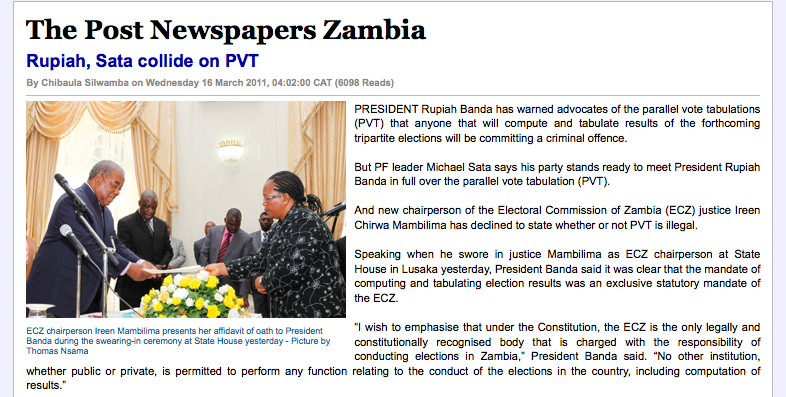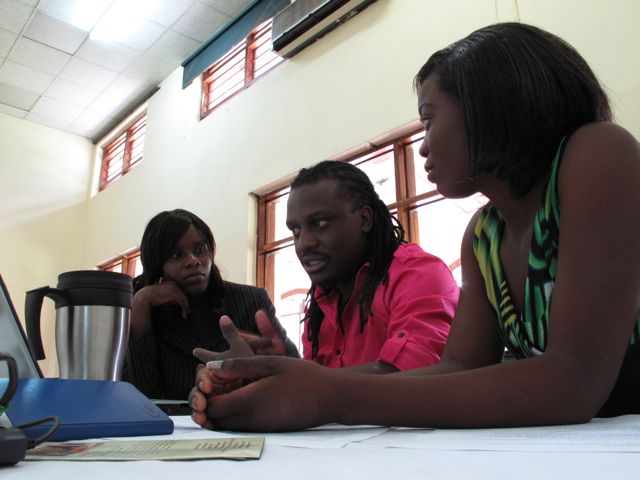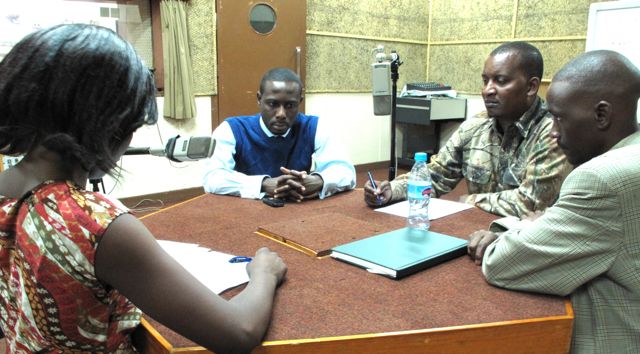Interviews, talkshows and reporting Zambia’s elections
Although an official date has not yet been announced, Zambia is well and truly in the grip of election fever. Presidential and parliamentary elections are due to be held before October.

Newspapers, both state-owned and private, scream the election promises of politicians. Talk radio programs are full of the opinions of voters and TV news bulletins of the national broadcaster offer generous campaign coverage of the incumbent President, Rupiah Banda.
Strike up a conversation in a taxi in the capital Lusaka, and at some point, talk with the driver will invariably turn to politics and what is good for "the people".
It was against this background of elections that the DW-Akademie conducted a training course in Lusaka with radio journalists on Interviews and Talkshows. And, it wasn't any surprise that our participants wanted to explore political themes, develop their skills to interview politicians and discuss ways to improve talkshow programming during the election campaign.
Asking tough questions
Our group of ten participants were quite diverse. Half were from Lusaka and worked in local community radio stations. Two journalists were from rural community stations and three journalists had travelled from neighbouring Malawi to attend the course.

Through group discussions several recurring points came up about conducting interviews:
"It's hard to get politicians and the "big fish" to answer questions."
"Sometimes politicians try to intimidate you when you ask them tough questions."
"I find it hard to stay in control of the interview when a politician just keeps on talking and talking."
"If we really grill someone in an interview, we might face some problems."
Many journalists might recognise or have experienced some of these problems first hand. And, they can be even more challenging to face during live programming or if there is a culture of intimidating journalists.
Everyone agreed on the importance of being well prepared for an interview – doing good background research; determining what is the purpose of the interview; working out your first question; and, thinking about a possible structure of the interview.
Of course, the importance of listening carefully to answers and being aware of asking questions on behalf of the audience was also emphasized.
Together we analysed interviews, explored different types of questions, practised interviewing in role play exercises and shared our tips on polite ways to interrupt particularly verbose interviewees.
Something that also generated a lot of discussion in the group was this blog post from our friends at the BBC World Service Trust.
Trainer Nick Raistrick offers some interesting thoughts on making interviews with politicians easier. For instance, having a "green room" or a quiet place in the station to brief guests before a program; getting politicians to answer questions on air from listeners; matching guests with appropriately experienced journalists/presenters; or, agreeing to an appropriate amount of time for greetings that does not run down valuable airtime.
All of which are well worth considering to complement the basic principles of good interviews.
What on earth is PVT?
When it came to producing our talkshows, one topic was very popular – the debate over PVT or Parallel Vote Tabulation. As Zambia edges closer to elections, this three letter acronym is shaping up to be a very hot election issue.
In a nutshell, several non-governmental organisations and election observer groups want to independently tabulate polling station results in order to help verify the official results announced by the Zambian Electoral Commission.
The Zambian government says it is opposed to PVT in the forthcoming elections and has even questioned whether PVT is legal. This despite the use of PVT during the 2008 elections. The anti-PVT argument also cites post-election violence in Ivory Coast as one reason why PVT should be avoided.
Several foreign governments are supportive of PVT as an election monitoring tool during Zambia's elections. Here's a short clip of the British High Commissioner to Zambia, Tom Carter, discussing PVT on Zambia's MUVI-TV.
And, here's a vox pop that one group in our workshop produced canvassing people's opinions on the streets of Lusaka about PVT.
Group 3 vox pop on PVT by fieldreports
Without a doubt PVT will continue to be an election issue will that require journalists to explain the debate accurately and fairly to their audiences – from big city media through to the smallest country community radio stations.
Weak journalists or weak politicians?
Our participants were also fortunate that leading journalists in Lusaka were very willing to offer their views and time – either for interviews or as studio guests in our practice talkshows. Costa Mwansa is the head of news and current affairs at the commercial TV station MUVI-TV and was a lively guest in a studio panel discussion on parallel vote tabulation.

(Costa Mwansa second from left, during DW-Akademie workshop talkshow in Lusaka)
I caught up with him afterwards to hear his views on politics and election reporting in Zambia. Mwansa says some politicians don't understand the role of the media during elections, and are not comfortable with how deep journalists probe into their background or their policies.
He's also concerned about the strong perception among politicians, especially those in power, that private or commercial media in Zambia is simply "anti-government".
Below you can listen to more of the interview with Costa Mwansa on Zambia's media and the upcoming election.
Costa Mwansa MUVI-TV Zambia by fieldreports
Author: Guy Degen
Guy Degen and Jasper Funck conducted a six day training workshop in Zambia in cooperation with ZAMCOM. The training is part of a regional DW-AKADEMIE program on Local Reporting in Southern Africa, designed to support community, commercial and public radio stations.




Feedback